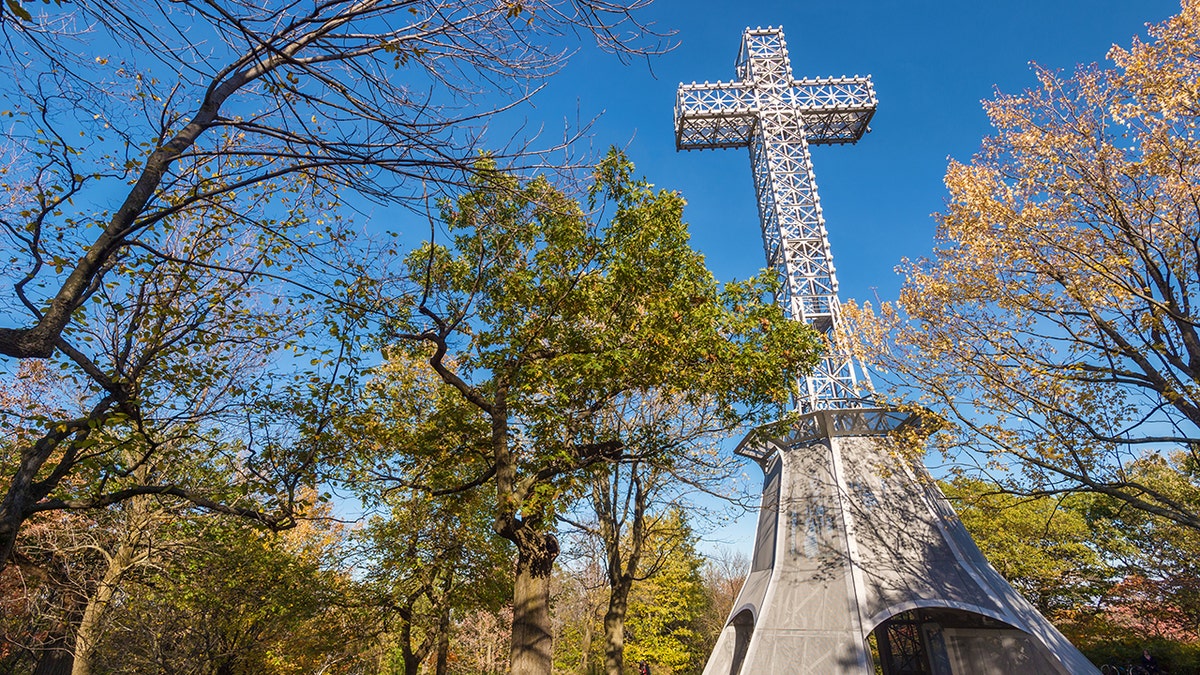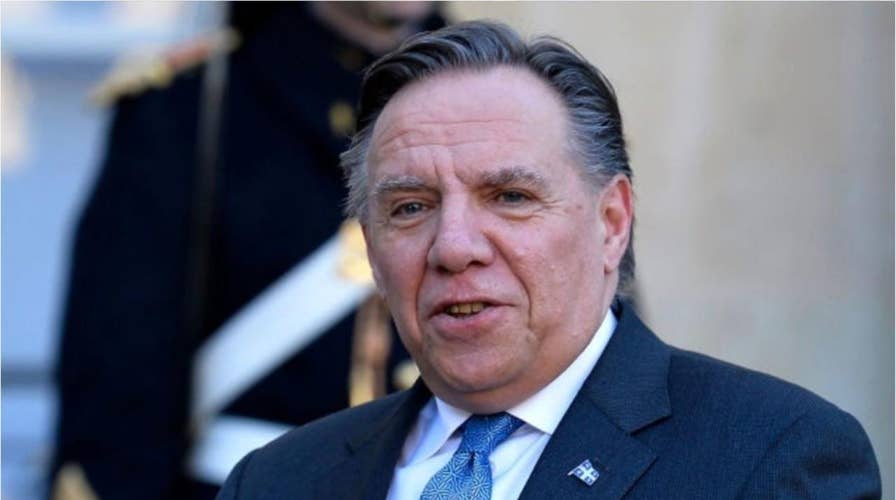Québec's government has found itself in a pitched battle with its school districts, hospitals and police departments over efforts to ban religious symbols from the heads and necks of its teachers and cops.
Depending on who you ask, the battle is either an absolutely necessary step to protect the province’s secular and French heritage, or an unacceptable infringement upon individual liberty.
Last fall, François Legault became Québec’s premier after his conservative-populist Coalition Avenir Québec (“Coalition for Québec’s future”, or CAQ) party took power for the first time.
Legault’s electoral programme called for sweeping changes to the way Canada’s second-largest province is governed, from the abolition of school districts to a requirement that all immigrants settling in the province speak French fluently.

Last fall, François Legault (pictured) became Québec’s premier after his conservative-populist Coalition Avenir Québec (“Coalition for Québec’s future”, or CAQ) party took power for the first time. (Getty)
CALIFORNIA CHURCH'S UNTOUCHED WOODEN CROSS BECOMES SYMBOL OF HOPE IN WILDFIRE AFTERMATH
However, perhaps the most controversial pledge made by the CAQ was to ban the wearing of all religious symbols by public-sector workers.
The wide-ranging ban, which is expected to be put to a vote in the provincial legislature later this month, would apply to anyone who is on the province’s payroll and in a “position of authority”. Included in that definition are school teachers, attorneys, police officers, and judges.
At an emergency public meeting earlier this week of the province’s largest English-Language school district, the English Montreal School Board (EMSB), parents and staff alike raised voices of alarm over the provincial government’s planned ban.
“Why are we focusing on these kinds of issues? This is personal freedom, actually, and it should be given to us.”, parent Saba Ansari, who is Muslim, said at the meeting.
The board’s chair, Angela Mancini, concurred, saying, ”Our teachers are wearing religious symbols — it has had no effect on students’ success.”
However, the board acknowledged that there would be little they could do as a political entity to stop the province-wide implementation of a ban on religious symbols.

The second-largest opposition party, the left-wing Québec Solidaire party, have made their support for any ban on religious symbols contingent on it applying equally to symbols of Christianity, of which there are many in Québec. QS has often called for the prominent cross that sits, illuminated, atop Montréal’s Mount Royal to come down (iStock)
The debate surrounding religious symbols in Québec has consumed the province’s politics for more than a decade. In 2008, the then-Liberal government commissioned a report that recommended religious symbols be banned for judges, prosecutors, police officers and prison guards – but not teachers.
Today, all four of the province’s major political parties agree that state secularism – or “laïcité” in French – should be preserved by any means necessary. Their disagreements lie only in how deeply the state should infringe on the religious freedoms of the individual in the process.
In 2014, then-Premier Pauline Marois, of the nationalist Parti Québécois, attempted to introduce a ban very similar to the one François Legault and the CAQ are proposing today. Known at the time as the “Charter of Values”, Marois’s government was defeated at an election before it could become law.
The Liberal government that succeeded hers chose a much more surgical approach to religious symbols, which banned only face-coverings like the niqab or burqa and not hijabs, crucifixes or yarmulkes. Perhaps the fiercest opponent of that law, coincidentally, was François Legault, who claimed the ban did not go far enough to protect state secularism.
Many critics of Legault’s approach to religious symbols have fretted that it would disproportionately target Muslim women who wear hijab, but it would equally apply to Jewish men who wear yarmulkes. It is also an open question as to whether a person who wears a crucifix would also be subject to the ban.
The second-largest opposition party, the left-wing Québec Solidaire party, have made their support for any ban on religious symbols contingent on it applying equally to symbols of Christianity, of which there are many in Québec. QS has often called for the prominent cross that sits, illuminated, atop Montréal’s Mount Royal to come down, and for the myriad of streets named for Saints in nearly every city in the province to be renamed as a part of any plan to secularize the province. The idea isn’t universally supported by the party’s leadership, but is popular within the more hardline circles of the membership
NEW YORK TIMES REPORTER SLAMMED FOR SEEKING 'OPPOSITION RESEARCH' ON CHRISTIAN SCHOOLS
François Legault’s response to that idea has been less than enthusiastic.
“I think we have to admit that we have a Christian heritage in Québec and we cannot decide tomorrow that we'll change the names of schools and change all our past”, he said in 2017. The CAQ government has made clear that their focus in banning religious symbols is largely, if not entirely, on non-Christian religions.
In a controversial move, ahead of the introduction of the legislation that will codify the ban, the provincial ministry of education asked Québec’s school districts for a tally of how many teachers wore religious symbols.
Catherine Harel Bourdon, the president of the province’s largest school district, the Commission scolaire de Montréal, called the request “pretty absurd”, and like nearly every other district in Greater Montréal, she refused to comply, citing protections for religious freedom that are enshrined in Canada’s constitution.
The minister in Legault’s government charged with implementing the religious symbol ban subsequently sought to downplay the alarm his request created.
CHRIS PRATT FOLLOWING 21-DAY FAST BASED ON THE BIBLE
"Right now, we are writing the bill about the secularization of the state ... and I need to know all the information about that subject," Immigration & Diversity Minister Simon Jolin-Barette said in an interview with the CBC’s French-language service.
Unlike in the U.S., Canada’s constitutional freedoms are not absolute. A mechanism, known as the “notwithstanding clause”, included in the Canadian Charter of Rights & Freedoms allows a provincial legislature to ignore constitutionally-protected freedoms – including the freedom of religion – if they vote to do so. Legault has said repeatedly that he is prepared to invoke the clause if his religious symbol ban is struck down by Canada’s courts.
If Legault chooses to make such a drastic move, he can likely expect backlash. In a warning shot to the Québec premier, Prime Minister Justin Trudeau said late last year that invoking the notwithstanding clause is “not something that should be done lightly, because to remove or avoid defending the fundamental rights of Canadians, I think it’s something with which you have to pay careful attention.”
CLICK HERE FOR THE FOX NEWS APP
However, those worried by the prospect of a world where public servants cannot show their adherence to a religion may have little prospect of stopping it. While opposition to the religious symbol ban has been loud, it has not been especially widespread – a poll conducted late last year found that well over two-thirds of Québécois support the ban as it has been proposed by Legault’s party.

